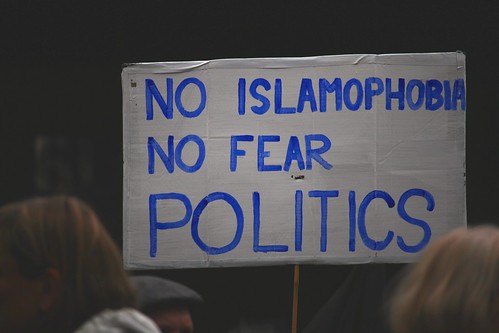India condemns all forms of religiophobia…: Ruchira Kamboj as UN adopts resolution on ‘Measures to combat Islamophobia’
Islamophobia #Islamophobia

New York [US], March 16 (ANI): India has strongly condemned all forms of religiophobia, be it anti-Semitism, Christianophobia, or Islamophobia as it stands against all anti-Hindu, anti-Buddhist, and anti-sikh sentiments, the country’s permanent representative to the UN said warning against dividing the global body into religious camps.
Addressing the United Nations General Assembly during the adoption of a resolution ‘Measures to combat Islamophobia’ at the 78th session of the United Nations General Assembly, India’s Permanent Representative to the UN, Ruchira Kamboj, said that phobia pertaining to one’s religion or faith extends beyond the Abrahamic religions.
Show Full Article
“India stands against all forms of religiophobia, be it anti-Semitism, Christianophobia, or Islamophobia, as we stand against all anti-Hindu, anti-Buddhist, and anti-sikh sentiments,” Kamboj said.
She further explained India’s position on the resolution on ‘Measures to combat Islamophobia’ and said, “In our world today, we are confronted with escalating geopolitical tensions and unequal developments resulting in a concerning rise in intolerance, discrimination, and violence based on religion or belief.”
“India, as a proud champion of pluralism, firmly upholds the principle of equal protection and promotion of all religions and all faiths,” she added.
Kamboj emphasised that India’s rich history as a pluralistic and democratic nation embracing diverse religions has long served as a refuge for those persecuted for their faith.
Highlighting the “Sarva Dharma Sama Bhava”, she said whether Zoroastrians, Buddhists, Jews, or adherents of any other belief, they have consistently found in India, a sanctuary free from persecution or discrimination.
“At the heart of this ethos is our principle of Sarva Dharma Sama Bhava, encapsulating indian secularism and affirming the inherent goodness of all religions, each deserving of equal respect,” she said.
This principle isn’t merely a facet of our culture, it is firmly enshrined within the constitution of India, Kamboj added.
She further strongly condemned the acts motivated by antisemitism, Christianophobia, or Islamophobia.
“It is therefore with deep concern, that we observe the growing manifestation of intolerance, discrimination, and violence against followers of various religions. We condemn all acts motivated by antisemitism, Christianophobia, or Islamophobia,” she said.
However, it is crucial to acknowledge that such phobias extend beyond the Abrahamic religions, Kamboj said.
The term Abrahamic religion is a category to group the three major religions Judaism, Christianity and Islam together.
“Clear evidence shows that over decades, followers of non-Abrahamic religions have also been affected by religiophobia. This has led to the emergence of contemporary forms of religiophobia, particularly anti-Islam, anti-Buddhist, and anti-Sikh elements,” she added.
Highlighting the increasing attacks on religious places of worship, Kamboj said that these contemporary forms of religiophobia are evident through such attacks on gurudwaras, monasteries, and temples, as well as the spreading of hatred and disinformation against non-Abrahamic religions in many countries.
“The destruction of the Bamiyan Buddhas, violations of Gurudwara premises, massacres of Sikh pilgrims in Gurudwaras, attacks on temples, and the glorification of breaking idols in temples, all contribute to the rise of contemporary forms of religiophobia against nonabrahamic religions,” Kamboj said.
She further stressed that Hinduism, with over 1.2 billion followers, Buddhism, with more than 535 million and Sikhism, with over 30 million followers worldwide, are all subject to religiophobia.
“It is time that we acknowledge the prevalence of religiophobia rather than just single out one,” Kamboj emphasised.
Kamboj during the general assembly, urged, “I would ask all member states to consider the broader scope of religious discrimination that persists globally.”
While the issue of Islamophobia is undoubtedly significant, however, other religions are also facing discrimination and violence.
Kamboj further said that allocating resources solely to combat Islamophobia while neglecting similar challenges faced by other faiths, might inadvertently perpetuate a sense of exclusion and inequality.
Moreover, these substantial budgetary implications of establishing such a position prompt us to pause and reflect on whether this is the most effective use of resources.
Highlighting on appointing a United Nations Special Envoy to combat Islamophobia, Kamboj said, “We are in principle opposed to the creation of the post of a special envoy based on a special religion.”
“We trust that the resolution adopted today does not establish a precedent that could result in numerous resolutions centred on phobias tied to specific religions, potentially dividing the United Nations into religious camps,” she stressed.
Kamboj emphasised the need for the United Nations to maintain its stance above such religious concerns, which have the potential to fragment us rather than unite us under the banner of peace and harmony, embracing the world as one global family.
Munir Akram, Permanent Representative of Pakistan to the United Nations, introduced the resolution on Measures to combat Islamophobia during the 62nd plenary meeting of the General Assembly on the Culture of peace. (ANI)
This report is auto-generated from ANI news service. ThePrint holds no responsibility for its content.